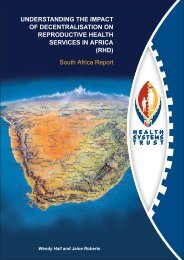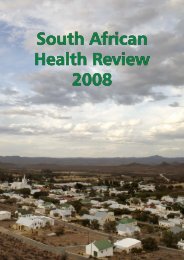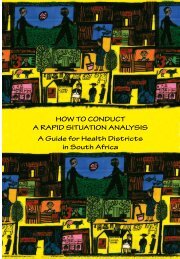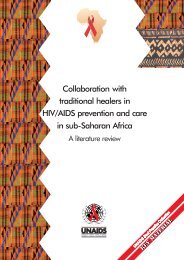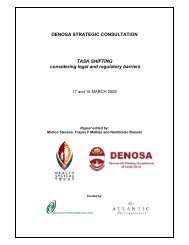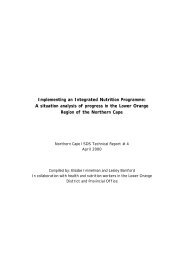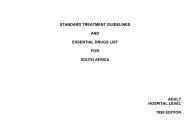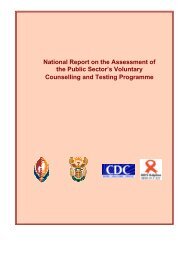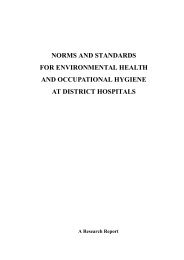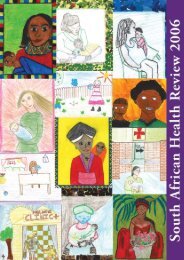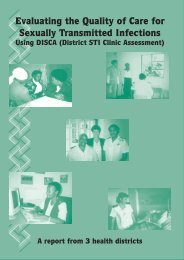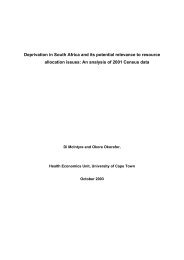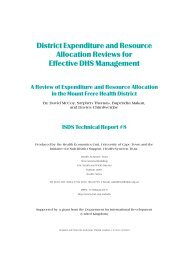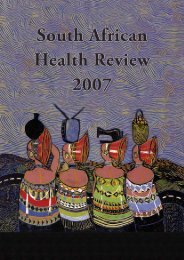COMMUNITY BASED SITUATIONAL ANALYSIS Maternal and ...
COMMUNITY BASED SITUATIONAL ANALYSIS Maternal and ...
COMMUNITY BASED SITUATIONAL ANALYSIS Maternal and ...
Create successful ePaper yourself
Turn your PDF publications into a flip-book with our unique Google optimized e-Paper software.
2. OBJECTIVES OF THE <strong>SITUATIONAL</strong> <strong>ANALYSIS</strong><br />
HST together with the University of the Western Cape (UWC) took responsibility for providing<br />
insight for the first three objectives of the project, namely:<br />
1. To determine factors influencing utilisation of maternal health services <strong>and</strong> barriers to<br />
utilisation of maternal health services (including loss to follow-up of mothers <strong>and</strong> infants<br />
in the PMTCT programme).<br />
2. To determine the level of awareness of risk factors associated with poor maternal <strong>and</strong><br />
perinatal health outcomes among women <strong>and</strong> men.<br />
3. To determine the health seeking behaviours of HIV-positive <strong>and</strong> HIV-negative pregnant<br />
women.<br />
3. METHODS<br />
Research Sites<br />
Three sites were chosen for the research from communities where the HST/UWC consortium<br />
has longst<strong>and</strong>ing research links. These sites are situated in the Western Cape, KwaZulu-Natal<br />
<strong>and</strong> the Eastern Cape. The three sites represent diverse geographical settings in South Africa,<br />
namely; a peri-urban township, a rural district <strong>and</strong> a peri-urban farming region, as well as<br />
differences in HIV prevalence <strong>and</strong> socio-economic situations.<br />
Study Methods<br />
A cross sectional descriptive study was conducted. Quantitative <strong>and</strong> qualitative data were<br />
collected from households that participated in the national PMTCT cohort study (HIV-positive<br />
<strong>and</strong> HIV-negative) <strong>and</strong> from households that did not participate in this study (unknown HIV<br />
status). From each of the three PMTCT cohort sites, 20 women who were known to be HIVpositive<br />
<strong>and</strong> 20 women who were known to be HIV-negative were r<strong>and</strong>omly sampled from the<br />
list of original participants. 20 women were also r<strong>and</strong>omly selected from the list of births in the<br />
last 9-12 months generated by Community Health Workers (CHWs) to provide a sample of<br />
women who were not in the PMTCT cohort study. A husb<strong>and</strong>/partner or other significant<br />
household member was also interviewed from each of these 60 households to explore<br />
knowledge <strong>and</strong> underst<strong>and</strong>ing of family members around pregnancy risks <strong>and</strong> maternity care.<br />
In addition to the cross-sectional descriptive survey qualitative case-studies of adverse<br />
outcomes were also conducted. A sub-sample of women/households was purposely selected<br />
to examine particular cases of interest, for example households with a known maternal or infant<br />
death, a mother with no antenatal care or who had a home birth. The semi-structured<br />
interviews in these households were supplemented with a qualitative interview examining the<br />
circumstances <strong>and</strong> issues around the event of interest, e.g. the maternal death. Approximately<br />
20 case studies were to be done in each of the sites.<br />
Home visits were made to selected women <strong>and</strong> written informed consent was obtained from all<br />
women prior to initiation of the interview. Data was collected using semi-structured interviews<br />
with pregnant women, partners <strong>and</strong> other key informants by trained field researchers. The<br />
instruments had modules on basic socio-demographic data, utilisation of <strong>and</strong> barriers to<br />
utilisation of maternal health services, knowledge of risk factors associated with poor maternal<br />
<strong>and</strong> perinatal health outcomes, frequency of postnatal health service contacts, sources of<br />
community information on maternal health <strong>and</strong> PMTCT <strong>and</strong> attitudes towards maternal health<br />
services.<br />
Community Based Situation Analysis: <strong>Maternal</strong> & Neonatal Follow-up Care<br />
viii



